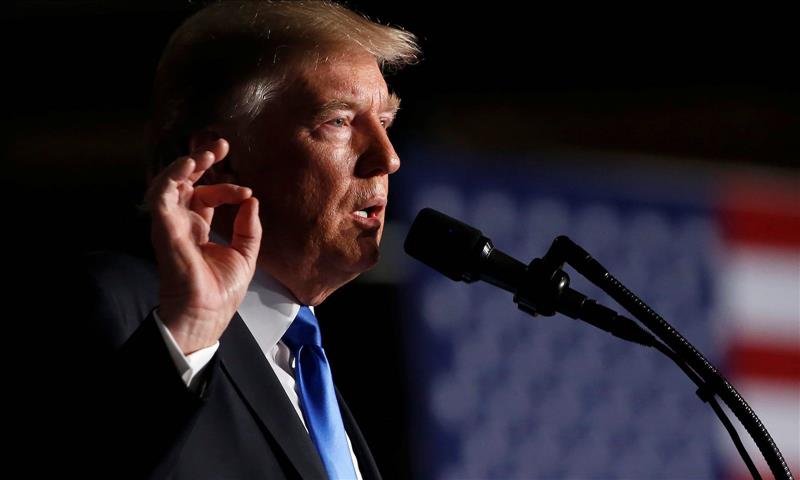
Trump's Afghanistan policy is riddled with flaws
Being circled by military minds and advisers, US President Donald Trump has revealed a new Afghanistan policy without any surprise change of action. Under the new plan, nearly 4,000 fresh US troops will enter the country and join the "war against terrorism", particularly against the Taliban and ISIS.
The most imperative aspect of Trump's strategy is that of lambasting Pakistan for its dual role and the invitation to India. In his tirade against Pakistan, Trump reminded it of America's strategic and economic generosity to that country and asked it to eliminate safe havens for the Taliban – or face the consequences.
The DailyBrief Must-reads from across Asia - directly to your inboxThe policy has received mixed feedback. While India, Afghanistan and major US allies praised Trump for his bold stance, he was criticized from within his own country as well as by Russia, China and Pakistan.
Although the plan may sound plausible on the ground, while Afghanistan is witnessing bloodshed almost every day, its strategic dimensions for the region will have serious after-effects. The policy lacks a basic understanding of the region and of the divergent interests of multiple regional actors.
It has to be comprehended that the Afghan conundrum has a broader regional context, which is missing from Trump's Afghan policy. The main regional players in Afghanistan are Pakistan, India, Iran, China and Russia.
Pakistan, which shares a porous border more than 2,200 kilometers long with Afghanistan, has to be strategically aligned for any policy to succeed. Pakistan cannot tolerate hostility on both its eastern and western borders. Thus the US invitation to India to play a greater role in Afghanistan will witness new repercussions that could be disastrous for the region.
Iran, another influential regional actor, has been ignored. Iranian support for the Taliban and other Shiite militant groups has been an open secret. Thus Iran will also endeavor to pursue its own interests.
Similarly, China – another dominant regional player that previously tried via its Quadrilateral Coordination Group to initiate a peace process, although without much success – would also need recognition in any credible Afghanistan policy because of its stakes in the country. A peaceful Afghanistan is vital for China's future economic and strategic initiatives. Moreover, China aims for a peaceful and powerful Afghanistan because of the nexus between Afghan militants and its own indigenous militant groups allegedly based in the South Asian country.
Russia, despite its past experience in Afghanistan, is now held by the US to be supplying the Taliban with arms. However, Russia will always endeavor to seek the withdrawal of international forces from Afghanistan, which provides Washington and Moscow a rare opportunity to share the burden of working out a joint strategy to make the environment feasible for such a pull-out.
But with the isolationist plan outlined by Trump, the US has drawn new strategic borders within the region that will generate serious strategic confrontation.
Another missing link is a platform for collaboration of regional and international forces to deal with the menace of the so-called Islamic State group. ISIS has recently become a force in Afghanistan and is an imminent danger not only for that country but for the whole region, including Pakistan, India, Iran, Russia and China. The US policy would have been more credible if it had taken the opportunity to map out, in collaboration with regional players, a strategy to drive ISIS from the region.
In addition to this, the socioeconomic aspect has always been neglected in the case of Afghanistan. The country's socioeconomic status provides a breeding ground for terrorism. Poverty, hunger, illiteracy, corruption, social stagnation of the masses and inadequate health facilities are prominent features of today's Afghanistan.
The physical elimination of terrorist groups could provide quick relief but cannot negate the possibility of a re-emergence of these groups. Furthermore, the Trump policy does not promise any future betterment for the Afghan population. Other than military means, the policy lacks the basic tools to identify major socioeconomic means to deal with Afghanistan.
It also fails to address the growing confrontations within the national coalition government. The emerging political divisions and revival of warlords have presaged the further descent of Afghanistan into total chaos.
All in all, the recently announced US policy toward Afghanistan has many missing links, without which the possibility of long-term peace appears bleak.
Asia Times is not responsible for the opinions, facts or any media content presented by contributors. In case of abuse, .
Legal Disclaimer:
MENAFN provides the
information “as is” without warranty of any kind. We do not accept
any responsibility or liability for the accuracy, content, images,
videos, licenses, completeness, legality, or reliability of the information
contained in this article. If you have any complaints or copyright
issues related to this article, kindly contact the provider above.
















Comments
No comment